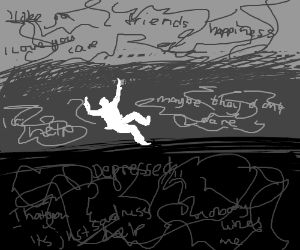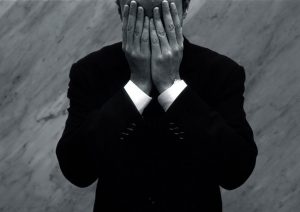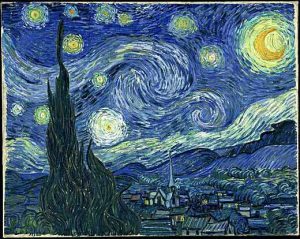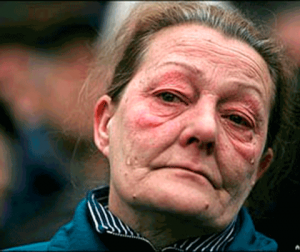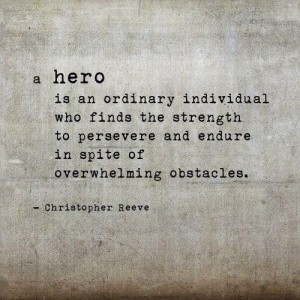Part of my hometown of Buffalo, NY’s campaign during depression awareness month, this article serves as a reminder that there is always someone to turn to and somewhere to go to for support. We just need to a better job of communicating the message. Read it here.
Depression: There’s Help and Hope
5 Ted Talks For Depression
Faith, who has coped with anxiety and depression throughout her life, shares a blog with links to 5 great Ted Talks about depression. The talks cover issues ranging from challenging stigma, to cognitive therapy, to everyday coping mechanisms. Each talk is informational and inspiring, with all offering a sense of hope that is grounded in the pain of past experience and guided by the belief that we all possess the strength to overcome the personal challenges presented by mental illness. Find them here.
The Return: Slipping Back Into Depression
I’ve slipped a bit, lately.
After months of relative peace, a return.
First, it was the sadness. I feel it when I wake up, eat my lunch, drive home from work, and hit the hay at night. While its intensity varies, it’s always there coloring my days.
My good sense of humor caught the last bus. A bone-wearying fatigue settles in as I withdraw from activities involving people.
I go into hibernation. I reserve my limited supply of energy for the essential things: work, a limited amount of outside commitments that can’t be avoided or rescheduled, my wife and daughter, a few clients, and filling up my truck with gas.
Life becomes pared down. It loses its sense of richness. This as a painful, the absence
On Depression, Hope, Hopelessness, and Freedom
Hope is a desire for something combined with an anticipation of it happening, it is the anticipation of something desired. To hope for something is to make a claim about something’s significance to us, and so to make a claim about ourselves.
One opposite of hope is fear, which is the desire for something not to happen combined with an anticipation of it happening. Inherent in every hope is a fear, and in every fear a hope. Other opposites of hope are hopelessness and despair, which is an agitated form of hopelessness.
Hope is often symbolized by harbingers of spring such as the swallow, and there is a saying that ‘there is no life without hope’. Hope is an expression of confidence in life, and the basis for more practical dispositions such as patience, determination, and courage. It provides us not only with aims but also with the motivation to attain those aims. As the theologian, Martin Luther said, ‘Everything that is done in the world is done by hope.’ Hope not only looks to the future but also makes present hardship easier to bear, sustaining us through our winters.
At a deeper level, hope links our present to our past and future, providing us with an overarching narrative that lends shape and meaning to our life. Our hopes are the strands that run through our life, defining our struggles, our successes and setbacks, our strengths and shortcomings, and in some sense ennobling them. Running with this idea, our hopes, though profoundly human—because only humans can project themselves into the distant future—also connect us with something much greater than ourselves, a cosmic life force that moves in us as it does in all of nature. Conversely, hopelessness is both a cause and a symptom of depression, and, in the context of depression, a strong predictor of suicide. “What do you hope for out of life?” is one of my most important questions as a psychiatrist, and if my patient replies “nothing” I have to take that very seriously.
Hope is pleasant in so far as the anticipation of a desire is pleasant. But hope is also painful, because the desired circumstance is not yet at hand, and, moreover, may never be at hand. Whereas realistic or reasonable hopes are more likely to lift us up and move us on, false hopes are more likely to prolong our torment, leading to inevitable frustration, disappointment, and resentment. The pain of harboring hopes, and the greater pain of having them dashed explains why most people tend to be modest in their hoping.
In his essay of 1942, The Myth of Sisyphus, the philosopher Albert Camus compares the human condition to the plight of Sisyphus, a mythological king of Ephyra who was punished for his chronic deceitfulness by being made to repeat forever the same meaningless task of pushing a boulder up a mountain, only to see it roll back down again. Camus concludes, ‘The struggle to the top is itself enough to fill a man’s heart. One must imagine Sisyphus happy.’
Even in a state of utter hopelessness, Sisyphus can still be happy. Indeed, he is happy precisely because he is in a state of utter hopelessness, because in recognizing and accepting the hopelessness of his condition, he at the same time transcends it.
Neel Burton, M.D., is a psychiatrist, philosopher, writer, and wine lover who lives and teaches in Oxford, England. He is a Fellow of Green-Templeton College, Oxford, and the recipient of the Society of Authors’ Richard Asher Prize, the British Medical Association’s Young Authors’ Award, the Medical Journalists’ Association Open Book Award, and a Best in the World Gourmand Award.He is author of Heaven and Hell: The Psychology of the Emotions, Hide and Seek: The Psychology of Self-Deception, and other books.
Depression and Faith: An Interview with Rabbi Mark Gellman
Podcast: Play in new window | Download
Today’s guest on our show is Rabbi Mark Gellman.
Rabbi Gellman is the Rabbi Emeritus at Temple Beth Torah in Melville, New York where he has served since 1981. He earned his Ph.D. in Philosophy from Northwestern University in 1981 where he also completed doctoral work in the History and Literature of Religions specializing in Buddhism and Judaism. He is the recipient of many honorary degrees.
Rabbi Gellman writes a weekly column, “The Spiritual State,” for Newsweek magazine and the syndicated column,“The God Squad,” read by readers around the world.
Welcome to our show Rabbi Gellman.
Dan:
Rabbi, during your time that you’ve been a Rabbi, and I understand that’s been decades now, have you counseled people with depression?
Rabbi Gellman:
Yes, I have. Although my general orientation, and I hope it’s the orientation of most clergy, is to refer people to professional psychiatrist or psychologists who specialize in this. It’s not something that clergy should enter, in general, because they’re not trained for it.
Dan:
Once you’ve referred those people and they are treating with a psychologist, psychiatrist, or both, do the clergy have some role in comforting the people with spiritual support with this kind of condition?
Rabbi Gellman:
Yes, I think we serve two roles.
One is what I would call “psychiatric first responders.”
We’re the ones who first alert people to the fact that they are depressed and that they need some kind of professional treatment in order to get back to some level of functioning life. The second purpose which we serve as clergy, if we are doing our jobs well, and our calling well is to provide to the community a message of hope. The antidote to depression, of course, is hope. And in a communal sense, Rabbis can provide that hope. In fact, it is my view that the search for hope that is the primary motivator for people to affiliate with religious denominations and to seek personally their own way to God. It is the search for hope, ultimately.
Dan:
Many people who I speak to around the country, and myself included, I am a practicing Catholic, and so often in the throes of depression, or maybe even at the beginning, I would often ask God, “Why me?” I think that so many people, and maybe it’s true for any kind of suffering that afflicts people, ask that seminal question. In your faith, and in your experiences, how do you respond to that?
Rabbi Gellman:
Well, I have a rather unconventional view of many things. And I have an unconventional view of that question. First of all, I don’t think it’s a common question. People say it is, but I don’t believe it. I’ve never heard it. Most people are not really consumed by the question of why this has happened to them.
There’s two reasons for that. First, they can think of a lot of reasons it’s happened to them. So, they know the reasons it’s happened to them. Second, the question, “why me,” presumes a kind of spiritual and ethical arrogance that most people are mature enough not to have. By that, I mean the question, “Why me?” if you sort of unpack it a little, means, “I am so righteous, I am so good, I’ve done so much for the world, and for my family, and for my community, that my virtue is so enormous, that it should protect me against all evil.
Now, no one really believes that.
No one believes, in their right mind, in the list of the greatest human beings that have ever lived, Gandhi and Mother Teresa, that they should be No. 3. I honestly don’t think people ask the question, “Why me?”
My approach has always been on two levels. One on a level of personal counseling to try to get people to find some resources to find some reasons to hope and I have some techniques that are very effective in that way.
Second, in my teaching, to explain to people that there are two reasons why bad things happen to them. The first is that they caused them to happen. People who have lung cancer after a lifetime of smoking really have no right to say, “Why me?” They did it to themselves. People who have neglected their physical fitness and have developed different pathologies that come from obesity or inactivity have done it to themselves. So, much of what happens to us, that is evil, is self-produced.
The second reason why bad things happen is because of what Aristotle called, “natural evil”. That is just the way the world works. A Rabbi said a phrase, “Olam K’minhago nohgge,” which means the world goes according to its own order. It means if you’re walking along the street and a brick falls from a scaffolding and you’re underneath, it’s bad luck on you. But, that’s just the way the world works. If you happen to be in a place where a tornado hits, or a hurricane hits, it’s the way the world works and this natural order of the world is not evil. It’s just the natural working of the laws of the world. A Tsunami is not evil. If a wave crashes over an uninhabited island it’s not evil. It’s only if people are there. Well, people choose to be there. The point is there are things we do to ourselves and there are things that happen to us because the world is the way it is.
Dan:
With respect to “the way the world is, would that include our bodies, our brains, and our genetics? There are now studies which show that many, many people, especially with the more severe forms of depression, have a strong genetic vulnerability to depression. Or, other people grow up in neglectful homes where they are neglected or physically abused. Those people have high rates of adult-onset depression. Can you follow-up on this?
Rabbi Gellman:
Sure, I mean, sometimes you draw some bad cards. You draw environmental bad cards, you grow up in an abusive, deprived upbringing, and, in some cases, you draw a bad genetic card. But, I would say to both those things that there are ways that people overcome those inheritances.
For example, there are people who grow up in very, very difficult circumstances. And for some reason, they are disciplined and hopeful, and they are able to move out into better circumstances for the rest of their life. Other people surrender to the difficulties of their environment. How do you distinguish between one and the other? Why is someone able to pull themselves up by their bootstraps and someone else isn’t from the same deprived neighborhood? So, something else is at work here.
As far as the genetic inheritance, it may be true, it probably, certainly is true, studies in schizophrenia certainly seem to indicate it is true, that there’s a strong genetic component to depression. However, there’s a problem with focusing on that medical fact and the problem is that it gives people an excuse to wallow in their depression, to surrender to their depression. Hey, look, I’ve known people who are obese, who say, “Look, I can’t lose weight because I’m genetically fat.”
You know, that’s ridiculous.
You may have a genetic predilection to obesity, you my have a genetic predilection to depression, but that doesn’t mean you can’t fight it. And if you believe that this was your inheritance, it’s just another reason to surrender. And depression requires vigilance, and it requires very strong emotional dedication to becoming well again.
Dan:
Can you give us some insights into how the Jewish faith, the Jewish religion, views depression, and, specifically, do you give examples from the Old Testament that you believe are insightful into how people can see their depression and overcome their depression? You minister and you preach. Can you give us a little insight on that?
Rabbi Gellman:
The first is a personal understanding. I think it comes out of scripture, but not directly.
It’s a technique that I developed which I call, “spiritual balancing.” The history of this is that my wife and I, Betty, were living in Evanston near Northwestern University. We were remodeling an old house and the fellow that was helping us do some spakling was carrying two big containers of this spakle up the stairs and I said to him, “Why don’t you just carry one bucket up? Why carry two at once?” And he said, “Well, if I carry one it throws me off and it hurts my back. If I carry two, it keeps me in balance and I can carry twice as much.”
For some reason, it was an epiphany for me. It was a life-changing moment, just watching this guy carry spakle up the stairs. What I realized at that moment, and developed it as a counseling technique, and have spoken to psychiatric associations about it, is this technique of spiritual balancing.
So it works this way. Someone comes to me and they’re depressed, they’re in grief, they’re in a bad place. So I say, “Here’s what we’re going to do. We’re going to do five minutes of you telling me, in as much excruciating detail as you can, why your life is miserable. Five minutes.
And then, for the next five minutes, I want you to tell me why your life is wonderful. What are the wonderful things in your life. But it has to be for the same amount of time.
I do this often with people in grief. “Give me five minutes of how sad you are, and how broken you are that you’re loved one died and how unfair it is and how awful it is, and how it’s breaking you, and then five minutes what you loved about the person. And what was great about the person.”
What I discovered quickly, using this technique, is that in the end, people felt much better, at the end of the counseling session. The reason they felt better was not that anything had changed, but that they had balanced the miserable, depressive thinking that they had, that had imbedded itself in their brain because of their trauma, with positive, endorphin producing, hopeful thoughts that were also in their brain, but they weren’t accessing them because they weren’t thinking about it. They were obsessed with the loss. That’s the purpose of the Psalms, of many different passages in the Bible which is to get you at the moment you are most depressed to thing about the goodness that is still in your life and to overcome that natural tendency to focus on your burdens by turning in a conscious way to a meditation on your blessings.
Then you will discover when you do this that there is not a single day in which you wake up where your blessings do not exceed your burdens – not one single day.
Hope Counts: Rising Up from Depression
Depression corrodes our sense of hope.
Elizabeth Wurtzel, in her her best-selling book Prozac Nation, wrote:
“That’s the thing about depression: A human being can survive almost anything, as long as she sees the end in sight. But depression is so insidious, and it compounds daily, that it’s impossible to ever see the end.”
We can’t imagine a future without depression. When we’re in the thick of its slimy grasp, our deadened and bleak state seems to go on and on and on. Days become more about survival and meeting our most basic obligations. And nothing more because we don’t have anything left to give. Our life becomes smaller. We’re treading water because there doesn’t seem an end in sight. We’re hit by the stun gun of depression.
Our most urgent hope is . . . the absence of depression.
But the absence of pain isn’t the presence of joy and all that makes life worth living. As Richard O’Connor, Ph.D. wrote in his book Undoing Depression:
“We confuse depression, sadness, and grief. However, the opposite of depression is not happiness, but vitality – the ability to experience the full range of emotions, including happiness, excitement, sadness, and grief. It’s not sadness or grief, it’s an illness.”
Amanda Knapp writes eloquently of her own experience:
“Depression, for me, is a miles deep crater that I believe I will never crawl out of. It’s disillusionment born of an unfulfilled longing for peace. It’s fear that hope will raise me up just to drop me even further down. It’s a cocoon of despair snuggled all around me doing its best to keep me from breaking when the inevitable fall comes. The irony in all of that is that it precludes me from living and dreaming and hoping and praying. But I hold on to it so strongly at times, as if my life depends on it. Because sometimes it feels like it does. But I sit here today, decently removed from the worst of those moments of despair, and I feel myself longing for hope.”
It’s critical that we deliberately nurture a hope better than just relief from our melancholy. We need to rise up out of the dust of our suffering. It’s not enough to exist. Our existence must matter. Living a life with meaning and purpose give us hope because it brings out the best in us – even with depression. And it’s a heroic journey.
I once wrote:
“In my view, folks with depression are not so much hapless, as they are heroes.What’s a hero after all? Someone who has a great challenge to confront? Check. Someone who must confront great adversity? Check. Someone who must get up every day and do battle with a formidable foe? Check. You see, for those of you who are struggling with depression right now, YOU ARE THAT PERSON. You’re the person who has to get up every day and cope with your depression. Others can help and support you, but it’s ultimately your walk to walk. And what a courageous walk it is; every single step of it.
Some of the best people that I’ve been privileged to know struggle with depression. While they don’t have shiny medals pinned on their lapels, there is an unmistakable strength in them – even if they don’t see it. I know it’s real because I see and feel it – just like when I am in a grove of giant and majestic pines during a walk in the forest.”
Dr. Anthony Scioli, author of Hope in the Age of Anxiety, writes that one of the things needed to build up our hope muscles is faith and a spiritual foundation (whether it be in God, nature or a higher power) to experience a more open attitude for developing faith in others as well as the universe.
Pope John Paul II once said,
“Do not abandon yourself to despair. We are the Easter people and hallelujah is our hope.”
So, nourish hope in your heart. Surround yourself with hopeful people, places and books.
And resolve to be hopeful.
Copyright, 2016 by Daniel T. Lukasik
8 Things to Consider When Your Depression is not Getting Better
Here are important things to check into when you find yourself in this position. Read the Blog
Project Semicolon Empowers People Who Suffer from Depression
People Magazine reports that supporters of “Project Semicolon”, a group that is dedicated to presenting hope and love to those who are struggling with depression, are getting the grammatical symbol tattooed on their body to show solidarity with the project’s mission. Read the News
Seeds of Hope
Reverand, Susan Gregg-Schroeder writes, “I now know that depression affects all aspects of life, including our spiritual well-being. It strikes at our very soul, making us feel cut off from ourselves, from others, and from our understanding of God.” Read the Blog
7 Big, Stupid, Destructive Lies Depression Tells You
Depression is an insidious disease that causes the brain to spit out terrible distortions about one’s life. Read the Blog
Built by Staple Creative

